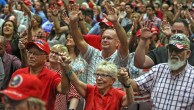Overview
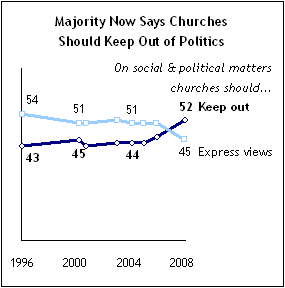
Some Americans are having a change of heart about mixing religion and politics. A new survey finds a narrow majority of the public saying that churches and other houses of worship should keep out of political matters and not express their views on day-to-day social and political matters. For a decade, majorities of Americans had voiced support for religious institutions speaking out on such issues.
The new national survey by the Pew Research Center reveals that most of the reconsideration of the desirability of religious involvement in politics has occurred among conservatives. Four years ago, just 30% of conservatives believed that churches and other houses of worship should stay out of politics. Today, 50% of conservatives express this view.
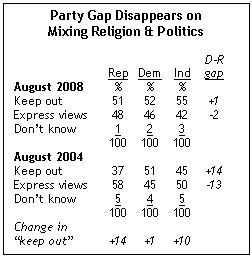
As a result, conservatives’ views on this issue are much more in line with the views of moderates and liberals than was previously the case. Similarly, the sharp divisions between Republicans and Democrats that previously existed on this issue have disappeared.
There are other signs in the new poll about a potential change in the climate of opinion about mixing religion and politics. First, the survey finds a small but significant increase since 2004 in the percentage of respondents saying that they are uncomfortable when they hear politicians talk about how religious they are – from 40% to 46%. Again, the increase in negative sentiment about religion and politics is much more apparent among Republicans than among Democrats.
Second, while the Republican Party is most often seen as the party friendly toward religion, the Democratic Party has made gains in this area. Nearly four-in-ten (38%) now say the Democratic Party is generally friendly toward religion, up from just 26% two years ago. Nevertheless, considerably more people (52%) continue to view the GOP as friendly toward religion.
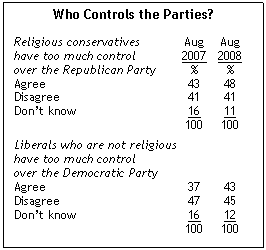
The poll by Pew Research Center for the People & the Press and the Pew Forum on Religion & Public Life finds increasing numbers of Americans believing that religiously defined ideological groups have too much control over the parties themselves. Nearly half (48%) say religious conservatives have too much influence over the Republican Party, up from 43% in August 2007. At the same time, more people say that liberals who are not religious have too much sway over the Democrats than did so last year (43% today vs. 37% then).
Social Conservatives’ Discontents
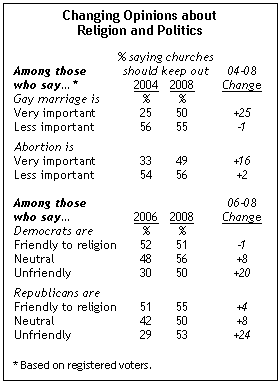
In addition to somewhat greater worries about the way religious and non-religious groups are influencing the parties, the survey suggests that frustration and disillusionment among social conservatives may be a part of the reason why a greater number now think that religious institutions should keep out of politics. However, there is little to suggest that social conservatives want religion to be a less important element in American politics.
The greatest increases since 2004 in the view that churches and other houses of worship should not express themselves on political matters have occurred among less-educated Republicans and people who say that social issues such as abortion and same-sex marriage will be important to their vote. For example, among people who rate gay marriage as a top voting issue, the percentage saying that churches should stay out of politics soared from 25% in 2004 to 50% currently; there was little change over this period on this question among people who do not view same-sex marriage as a very important issue.
Another indication that disillusionment may be in play in increased opposition to the mixing of religion and politics is seen in the fact that this sentiment has increased most among people who rate the major parties as unfriendly toward religion. The views of citizens who see the parties as neutral or friendly toward religion have been more stable on the question of whether churches and other houses of worship should speak out on political issues.
In short, the change of mind about the role of religious institutions in politics is most apparent among people who are most concerned about the very issues that churches and other houses of worship have focused on, and among those who fault the parties for their friendliness toward religion.
Changes in views about the role of churches in politics notwithstanding, many of the contours of American public opinion relating to broad questions of religion and politics remain largely unchanged. Two-thirds of the public (66%) say that churches and other houses of worship should not endorse one candidate over another, which is unchanged since 2004 (65%). And while most say it is important for presidents to have strong religious beliefs, they are divided about whether there currently is too much, or too little, in the way of expressions of faith by contemporary political leaders. Roughly comparable numbers say political leaders express their religious beliefs too much (29%), too little (36%) or the right amount (28%).
Despite their increased reluctance to see religious institutions speaking out on politics, conservatives and Republicans continue to express very strong support for a religious president and relatively high levels of support for expressions of religious faith and prayer by political leaders.
Soft Support Among Social Conservatives for McCain
While some social conservatives are expressing changed views about religion and politics, there is little indication that they are changing their voting preferences: John McCain has about as large a lead over Barack Obama among conservatives and white evangelicals as George Bush did at this stage in the campaign four years ago.
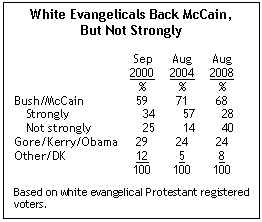
However, as has been the case since June, the current survey shows much more tepid support for McCain among white evangelical Protestants and conservatives generally than Bush enjoyed in August 2004. Just 28% of white evangelical Protestants say they are strong backers of the Arizona senator. Four years ago, 57% of white evangelicals described themselves as strong backers of President Bush.
As was the case in previous presidential elections, the voting inclinations of Catholic voters – especially white non-Hispanic Catholics – remain fluid. Four years ago at this time John Kerry held a slight edge over Bush among white non-Hispanic Catholics; but he lost that lead by the election. In the current poll, this group, which accounts for 18% of the electorate, is divided almost evenly: 45% support McCain, while 44% favor Obama.
Other Findings
The survey was conducted by telephone – both landline phones and cell phones – from July 31-Aug. 10 among a national sample of 2,905 adults. It finds that as the Democratic Party’s advantage in party identification has grown, there have been some notable changes in party affiliation within key religious groups. In 2008, about half of registered voters (51%) identify themselves as Democrats or lean toward the Democratic Party, while just 38% identify as Republicans or Republican leaners. In 2004, Democrats held only a slight, three-point advantage in party affiliation (47% to 44%).
While white non-Hispanic Catholics are divided in their presidential choices, they are increasingly identifying as Democrats. In surveys conducted this year, 49% of white non-Hispanic Catholics either affiliate with or lean toward the Democratic Party, while 40% identify with the GOP. In 2004, 47% of white non-Hispanic Catholics identified with the GOP while 45% affiliated with the Democratic Party.
The survey finds that the economy continues to dominate the concerns of voters. Nearly nine-in-ten (87%) say the economy will be very important to their vote this fall, up from 78% in October 2004. Energy has surged among voters’ concerns: 77% view energy as very important, compared with only 54% in the closing weeks of the last campaign.
For the most part, the issues that are important to the public as a whole are also important to particular religious groups. However, social issues, such as same-sex marriage, continue to be more important for white evangelicals than for other registered voters. Currently, 46% of white evangelicals say same-sex marriage will be a very important voting issue, compared with 28% of all voters. That is only somewhat less than the percentage of white evangelical voters who viewed same-sex marriage as very important in October 2004 (49%).
